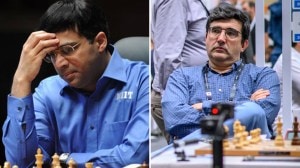PM hardsells reforms, his Parivar disinvests
Prime Minister Atal Behari Vajpayee this evening capped a day of hectic activity by anti-disinvestment hawks with a strong defence of the di...

Prime Minister Atal Behari Vajpayee this evening capped a day of hectic activity by anti-disinvestment hawks with a strong defence of the divestment policy and criticised, among others, the media for creating an impression that his Government had abandoned it altogether.
Using the launch of the Labour Ministry’s new magazine, Shram Samachar, to make his first policy statement after the disinvestment issue split his Government wide open last month, Vajpayee declared: ‘‘An anti-reforms atmosphere is being created. This is not good for the country or industry or the labour force. It is healthy to have a debate on disinvestment but to either rubbish the policy by saying that the Government is selling the nation’s wealth or to conclude that the disinvestment process has stopped because of differences is wrong.’’
Significantly, before his speech, Vajpayee and Deputy Prime Minister L K Advani had a 15-minute closed door meeting to review the day’s developments.
Both are clearly anxious about the regrouping of the swadeshi lobby, both within the Government and in the RSS. Vajpayee’s address was extempore. This is being seen as an indication that the position he took has Advani’s backing.
Yet, even as the PM sought to rebuke the swadeshi votaries, there were signs of an impending revolt on this issue within the Government. This morning’s meeting of the troika of anti-disvestment ministers George Fernandes, Murli Manohar Joshi and Ram Naik is believed to have resolved to extend the sweep of their campaign, from merely stalling divestment in the oil sector to opposing it in all profit-making public sector undertakings.
The ministers are also understood to have decided to widen their support base by seeking the backing of Opposition parties like the Congress which are on record criticising the Government’s disinvestment policy.
The meeting shadowed much of the PM’s speech, reflecting the Government’s worry at the divisions within the Union Cabinet on this issue. For instance, Vajpayee went out of his way to play down its implications for the future of disinvestment by maintaining that there was nothing wrong in people getting together in small groups for a healthy debate on a crucial issue. He also took a swipe at sections of the media for playing up reports of differences on a specific proposal. There’s been very little coverage of the non-controversial disinvestment decisions, he lamented.
Interestingly, after the troika met, Joshi is believed to have communicated the outcome of their discussions to RSS chief K S Sudershan while George met Vajpayee, fuelling speculation about his intentions. However, George’s aides insisted that there was no discussion of the disinvestment controversy.
During their 30-minute meeting in the morning, the three anti-disinvestment ministers took stock of the views of major political parties and decided to put up a united front against sale of government shares in the profit-making PSUs.
Sources said that the troika, when it met at Joshi’s house, were unanimous that disinvestment should be first carried out in loss-making government companies.
‘‘The objective was to improve PSU efficiency by getting the government out of it. Should it not be of loss-making companies?’’ said sources on what transpired at the meeting.
In case a profit-earning firm was selected for disinvestment, the route for the equity sale should be through an offer of government shares to the public rather than a strategic sale where the management control would go to the highest bidder, the three agreed.
They also favoured inclusion of the oil sector in the list of strategic sectors on account of its economic importance and its role in the country’s defence. Inclusion in the strategic list would ensure that the government continue to hold a majority stake in state-owned oil PSUs.



- 01
- 02
- 03
- 04
- 05




























